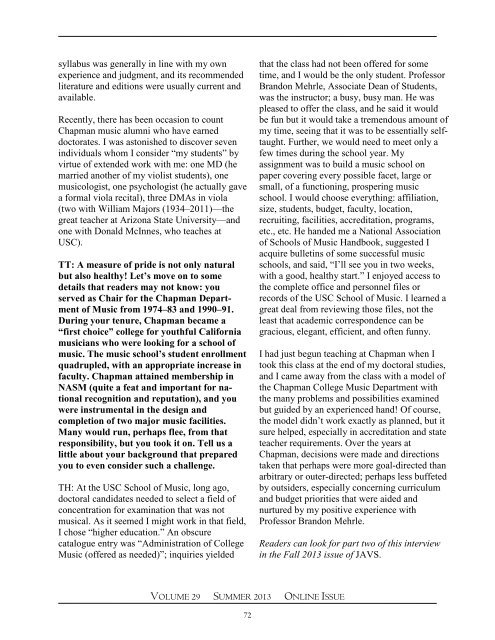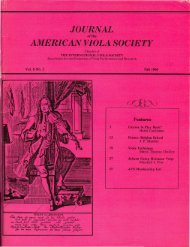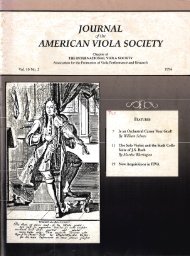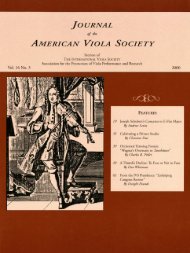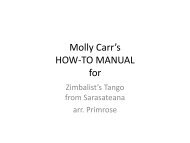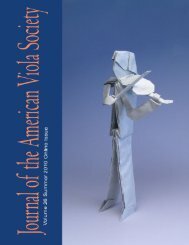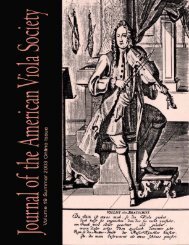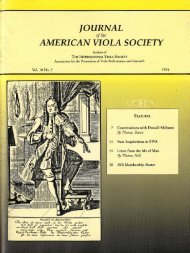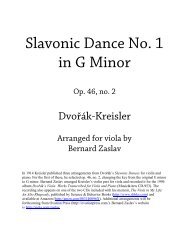Summer 2013 - The American Viola Society
Summer 2013 - The American Viola Society
Summer 2013 - The American Viola Society
You also want an ePaper? Increase the reach of your titles
YUMPU automatically turns print PDFs into web optimized ePapers that Google loves.
syllabus was generally in line with my own<br />
experience and judgment, and its recommended<br />
literature and editions were usually current and<br />
available.<br />
Recently, there has been occasion to count<br />
Chapman music alumni who have earned<br />
doctorates. I was astonished to discover seven<br />
individuals whom I consider “my students” by<br />
virtue of extended work with me: one MD (he<br />
married another of my violist students), one<br />
musicologist, one psychologist (he actually gave<br />
a formal viola recital), three DMAs in viola<br />
(two with William Majors (1934–2011)—the<br />
great teacher at Arizona State University—and<br />
one with Donald McInnes, who teaches at<br />
USC).<br />
TT: A measure of pride is not only natural<br />
but also healthy! Let’s move on to some<br />
details that readers may not know: you<br />
served as Chair for the Chapman Department<br />
of Music from 1974–83 and 1990–91.<br />
During your tenure, Chapman became a<br />
“first choice” college for youthful California<br />
musicians who were looking for a school of<br />
music. <strong>The</strong> music school’s student enrollment<br />
quadrupled, with an appropriate increase in<br />
faculty. Chapman attained membership in<br />
NASM (quite a feat and important for national<br />
recognition and reputation), and you<br />
were instrumental in the design and<br />
completion of two major music facilities.<br />
Many would run, perhaps flee, from that<br />
responsibility, but you took it on. Tell us a<br />
little about your background that prepared<br />
you to even consider such a challenge.<br />
TH: At the USC School of Music, long ago,<br />
doctoral candidates needed to select a field of<br />
concentration for examination that was not<br />
musical. As it seemed I might work in that field,<br />
I chose “higher education.” An obscure<br />
catalogue entry was “Administration of College<br />
Music (offered as needed)”; inquiries yielded<br />
that the class had not been offered for some<br />
time, and I would be the only student. Professor<br />
Brandon Mehrle, Associate Dean of Students,<br />
was the instructor; a busy, busy man. He was<br />
pleased to offer the class, and he said it would<br />
be fun but it would take a tremendous amount of<br />
my time, seeing that it was to be essentially selftaught.<br />
Further, we would need to meet only a<br />
few times during the school year. My<br />
assignment was to build a music school on<br />
paper covering every possible facet, large or<br />
small, of a functioning, prospering music<br />
school. I would choose everything: affiliation,<br />
size, students, budget, faculty, location,<br />
recruiting, facilities, accreditation, programs,<br />
etc., etc. He handed me a National Association<br />
of Schools of Music Handbook, suggested I<br />
acquire bulletins of some successful music<br />
schools, and said, “I’ll see you in two weeks,<br />
with a good, healthy start.” I enjoyed access to<br />
the complete office and personnel files or<br />
records of the USC School of Music. I learned a<br />
great deal from reviewing those files, not the<br />
least that academic correspondence can be<br />
gracious, elegant, efficient, and often funny.<br />
I had just begun teaching at Chapman when I<br />
took this class at the end of my doctoral studies,<br />
and I came away from the class with a model of<br />
the Chapman College Music Department with<br />
the many problems and possibilities examined<br />
but guided by an experienced hand! Of course,<br />
the model didn’t work exactly as planned, but it<br />
sure helped, especially in accreditation and state<br />
teacher requirements. Over the years at<br />
Chapman, decisions were made and directions<br />
taken that perhaps were more goal-directed than<br />
arbitrary or outer-directed; perhaps less buffeted<br />
by outsiders, especially concerning curriculum<br />
and budget priorities that were aided and<br />
nurtured by my positive experience with<br />
Professor Brandon Mehrle.<br />
Readers can look for part two of this interview<br />
in the Fall <strong>2013</strong> issue of JAVS.<br />
VOLUME 29 SUMMER <strong>2013</strong> ONLINE ISSUE<br />
72


